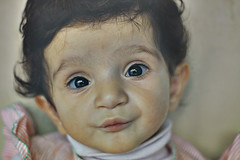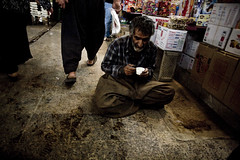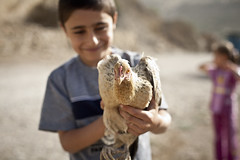Thursday, July 1, 2010
PLC blog post about Ahmad
Monday, June 21, 2010
Beautiful Photos from Iraq!



http://www.flickr.com/photos/buyshoessavelives/
Friday, June 11, 2010
Dr. Aso

The past few days of my internship have placed me in the offices of Dr. Aso Faeq. As a partner to PLC and an invaluable member of this Coalition, Dr. Aso is the only pediatric cardiologist serving a large area of Iraq, and the only pediatric cardiologist with interventional training in an even greater portion of the country. Given his position, Dr. Aso would already have an extensive patient list- but add to that the high incidence of congenital heart disease in Iraq, and it is not surprising that every time we have visited him there has been a waiting room overflowing with mothers and fathers holding and comforting their sick kids, whispering assurance and love into their ears.
These visits are heartbreaking, humbling, challenging and encouraging.
It is heartbreaking to realize how rampant CHD is in Iraq. The entire time Dr. Aso met with me and other interns he was seeing patient after patient, diagnosing ASD, TGA, Tetrology of Fallot, and other congenital heart defects one after another. It is heartbreaking to know that the best course Dr. Aso can pursue is often a procedure performed to extend a kid’s life a few years so that they can wait for an improbable surgery down the line.
It is humbling to see how Dr. Aso makes these diagnoses using very limited, mostly donated equipment in a public hospital with little institutional support. It is humbling to see him treat more patients in a day than many doctors do in a week, without any extra compensation, all the while with joy and a smile on his face.
It is challenging, as a student pursuing a career in medicine, to see such stark disparities in healthcare between western countries and the region where much of “western” medicine originated. It is challenging to hear this brilliant doctor humbly state that all he wants is the opportunity for more, better training so he can go further in treating his patients. (As an Iraqi, Dr. Aso was recently denied a visa to attend a training meeting of the Association for European Pediatric Cardiology, of which he is a member.)
And although I may leave Dr. Aso’s office heartbroken or humbled or challenged (or all three), I always leave his office encouraged as well. It is encouraging to know that, through his partnership with PLC, Dr. Aso can send families from his office to ours so that they may have a chance at surgery. It is encouraging to realize that even though Dr. Aso may be denied visas to travel and get more advanced training, we can bring the training to him and other local doctors with Remedy Missions. Most of all, it is encouraging to know that “long-term, local solutions” isn’t just a slogan. Long-term, local solutions are people like Dr. Aso.
Thursday, June 10, 2010
Short post- Kurdish phrases
Thursday, June 3, 2010
16/3/1988 - This is not a fun post.

Wednesday, June 2, 2010
Teaching, Football, etc.
On Monday night, Preston, Landon (an american friend here for a few days) and I went down to the football (soccer) courts and played some late night matches! They start playing well after the sun has gone down here, since it's way to hot to play in the day. We played from 10pm 'till 11pm with a group of local Iraqi/Kurdish guys! There were 9 of them and 3 of us, so we split up and played some 6v6. The courts are concrete with a short concrete wall all the way around each and a huge chain-link fence rising from that. There is also an unbelievable amount of dust. Five minutes into the game, my clothes, my face, my lips, my shoes, and even my LUNGS were coated with dust. It definitely takes some adjusting! The court is even slick from the layer of dust covering it. Nevertheless, it was a great time, and I actually held my own! Preston is a defender on his college soccer team, and Landon use to play competitively, so I think we shocked them with how good these Amerîkî could be at football!
We played again last night, this time it was Joshua Gigs, Preston, Landon, and I, and we ended up playing against a group that included the guy who ran the courts! They also played their 5 against our 4 the whole time! We held them off for a while, but eventually ran out of gas against their numbers advantage. I love playing here though, it is competitive but at the same time no one really keeps score or gets upset about anything. Almost the opposite of pick-up basketball back in the States. We were also invited back to play this Thursday and every Monday at 10pm! I love how easy it is to make friends here.
In the next few minutes we will be living our house here in Sulaymaniyah to head to Halabja. Halabja is the site of the largest chemical attack on the Kurds: a genocide committed by Saddam Hussein, and the largest chemical attack on a civilian population in the history of the world. I am trying to get myself emotionally prepared, although I'm sure I will not be ready to see the memorials and the graves. I'm very glad we get to do this. I think it is extremely important, as someone working primarily with Kurds, to see this huge and terrible event in their history. Although this will in no way allow me to know what it feels like to be a survivor of multiple genocides committed against my people, I think seeing the place will at least give me a little better picture than simply knowing some facts.
We are preparing to leave now, so I'm signing off. I'll try to post when I get back!

